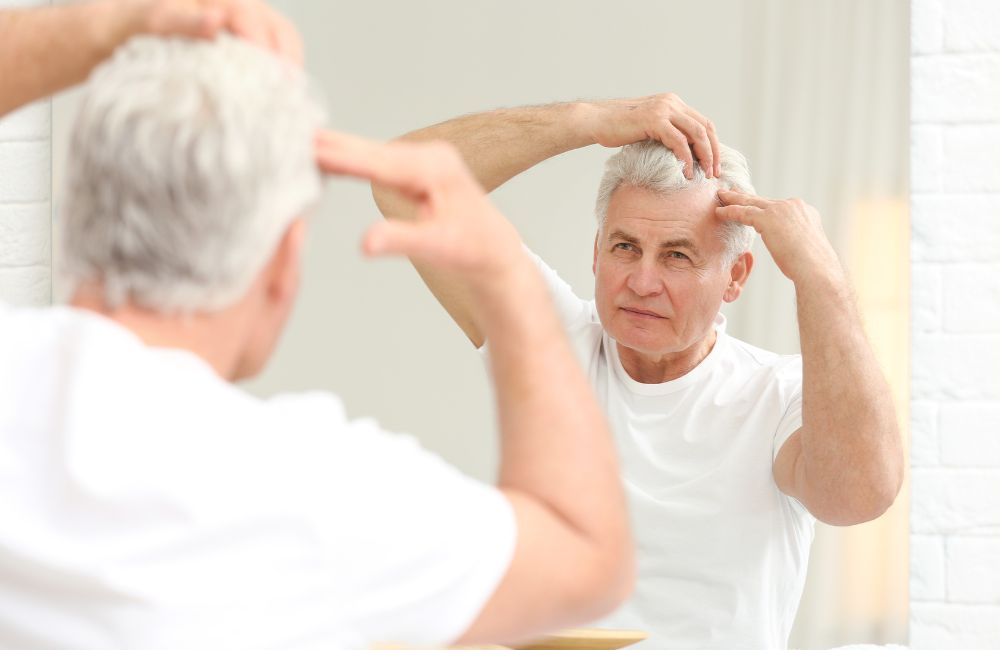Have you noticed your hair has started to thin since you have become a grandparent?
While you may think that this hair loss is a result of the pressure of having little people back in your life again, your thinning hair is much more likely to be caused by another factor.
One of the most common causes of hair loss is genetics, with a family history of hair loss making it much more likely for you to experience thinning hair.
Keen to find out more about why your hair has started to thin?
Read on to discover why some grandparents have thinning hair and others don’t. Plus, find out about the latest hair loss treatments that promise to restore your locks to their original glory.

Contents
What are the main causes of thinning hair?
As mentioned above, the most common cause of thinning hair is genetics. Therefore, if female or male pattern baldness runs in your family, you are much more likely to also suffer from this condition.
Some of the other causes of thinning hair include:
- Hormonal changes such as during pregnancy, after childbirth, and during menopause.
- Certain conditions, such as thyroid issues and immune-related disorders.
- Certain medications and supplements, such as those used to treat cancer, arthritis, depression, and high blood pressure.
- Radiation therapy.
- Stressful events such as after a physical or emotional shock.
- Excessive hair styling or hair treatments.
Is thinning hair hereditary?
Yes, hair thinning and hair loss are hereditary. If you have a history of balding on either your mother’s or your father’s side, you are much more likely to experience thinning hair than somebody who doesn’t.
Other factors that put you more at risk of thinning hair include your age, significant weight loss, certain medical conditions, including diabetes and lupus, stress, and poor nutrition.
What are the best treatments for thinning hair?
If you are experiencing hair thinning or hair loss, either as a result of genetics, old age, or another factor, then there are several treatments that you can try.
Hair transplant
A hair transplant is the only surgical procedure available for hair loss and is designed for people who suffer from male-patterned baldness. A highly effective and long-lasting treatment for hair loss, hair transplant surgery involves removing hair follicles from the back of the head and placing them on the scalp. Reputable clinics such as hshairclinic.co.uk provide hair transplants that deliver results.
OTC medications
If you don’t want to go down the surgery route, there are over-the-counter medications that you can try, such as minoxidil and finasteride. These medications are suitable for all hair types and typically come in the form of shampoo or foam.
Laser treatment
A relatively new treatment for hair loss, laser combs are designed to promote hair growth by using concentrated light to stimulate hair follicles. Research shows that this treatment works best when combined with other hair loss treatments, such as medicated shampoos.
It is worth noting that laser treatment for hair loss can be expensive, and you are not guaranteed results like you are with a hair transplant.
Low-Level Laser Therapy (LLLT)
LLLT is a non-invasive treatment option that uses red light wavelengths to stimulate hair growth. It works by increasing blood flow to the scalp and promoting the production of new hair follicles. LLLT can be performed in a clinical setting or at home using a handheld device. Consistency is key with this treatment, as it may take several months to see noticeable results.
Topical treatments
Along with medical interventions, topical treatments can help improve hair health. Look for products containing ingredients like biotin, keratin, redensyl, and peptides, which nourish the hair follicles and promote healthy hair growth. These treatments can be used in conjunction with other therapies or as standalone options for those with milder cases of hair thinning.
The bottom line
A combination of genetics and aging often contributes to thinning hair in grandparents. Hair loss, also known as androgenetic alopecia, is primarily influenced by the genes inherited from both maternal and paternal grandparents. As individuals age, the hair follicles shrink, leading to shorter and finer hair strands. Additionally, hormonal changes and medical conditions can lead to hair thinning in older adults. While the process of hair loss cannot be entirely reversed, various treatments and lifestyle changes can help slow down its progress and improve the appearance of thinning hair, providing grandparents with potential solutions and support.